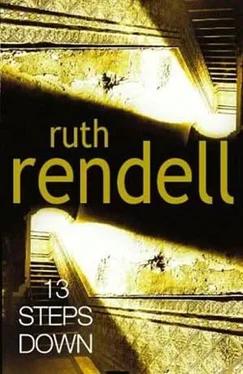Hearing from an acquaintance that you had ventured into the realm of television, I was moved to-the young man in the Internetcafe would surely count as an acquaintance. She was anxious not to begin by telling untruths. I was moved to renew oldfriendship -was that too forward? Most people would say fiftyyears was a long break in any friendship-I was moved to get intouch with you . She would have to say why. She would have tosay she wanted to see him. Gwendolen screwed up her fifth effortand sat disconsolate. It might be best to concentrate withoutpen and paper and resolve on her words before starting towrite them down.
A serious young man, Darel Jones was handling his move to a Docklands flat with tender care for his parents. Through school and university and his postgraduate studies, he had lived at home and now, at the age of twenty-eight, with a new and much better paid job, it was time to leave. Knowing he must do so before he was thirty, he had been careful once he came of age to do his own washing and ironing, eat out four times aweek, visit his girlfriends' places rather than bring them home for the night, and generally be independent. Thus he trod a fine line, for his mother would willingly and happily have done everything for him, welcomed girls, and forced herself not to apply the double standard, inwardly congratulating him on his choice while condemning them for their unchastity. He had spent at least two evenings a week with his parents, taken them out, gone to the cinema with them, been charming to their friends, and scrupulously thanked his mother for performing small services for him. Now he was leaving, to live at the other end of London on his own.
Neither parent had uttered a word of objection but on the eve of his move, the new furniture installed, his clothes in twosuitcases in the hall waiting to be put into his car, he saw a tear trickle down his mother's cheek.
"Come on, Mum. Cheer up. Suppose I'd been going to Australia like your chum Mrs. What'sher name's son."
"I didn't say a word," said Sheila Jones defensively."Tears speak louder."
"What'll you be like when he gets married?" Her husband passed his handkerchief, a move he had made on an average once a week during their thirty-year marriage.
"I hope he will. I know I'm going to love his wife."
Darel wasn't so sure. "That's a long way off," he said. "Look, I want you both to say you'll come over to dinner on Saturday. I'll be straight by then."
Sheila began to cheer up. "Tom and Hazel want us all to going next door for a drink this evening to say good-bye. I said wewould. Nerissa will be there."
Darel considered, but not for long. "You go," he said. "You can say good-bye for me."
"Oh, we wouldn't go without you. There'd be no point. Besides,we'd miss our last few precious hours with you."
If she hadn't said that model would be there he might have agreed. Nerissa Nash-why couldn't she have kept her father's interesting surname?-was very beautiful, any man would admit that, and according to his father, a nice girl. But Darel was wary of the whole celebrity world. He knew of it only from what he read in the newspapers. Since his preferred reading was usually the Financial Times , this wasn't much of a guide, but certain emotive words suggestive of that world aroused his distaste:club, fashion, star, public appearance, designer, and of course "celebrity" itself were among them. Someone belonging in that so-called elite must be empty-headed, ignorant,tasteless, and shallow. Such people were heading for empty,unhappy lives, failed relationships, dysfunctional families, alienatedchildren, and a desperate unwilliness to grow old.
What a prig you are, he often told himself, always resolving to be less censorious. The fact remained that he had no wish to extend his acquaintance with Nerissa Nash beyond replying "Good evening" to her "Hi" and raising his hand in a modifiedwave if he saw her at a distance.
It wasn't until the doorbell rang that Mix remembered Danila was coming round. He had forgotten to buy any cheap wine and now he'd have to give her that rather nice Merlot he'd bought for his own private consumption on Sundaynight. Spending the evening at home, as he thought alone, he had been enthralled in Chapter 3 of Christie's Victims , reading of
Muriel Bady, a 31-year-old woman, living in Putney and employed at the Ultra Radio Works in Park Royal. On leaving the police for no known reason, Christie had also gone to work there. He and she became friends, insofar as Christie was capable of friendship, and on several occasions she and her fiance and Christie with Mrs. Christie all went out together.
Muriel Bady suffered from chronic rhinitis and Christie claimed to be able to cure her with the aid of an inhalation device of his own invention. When his wife had gone away, once more to have a holiday with her brother in Sheffield, he invited Muriel around, gave her a cup of tea and showed her what he said was the device. However, though it contained Friar's Balsam, it also, unbeknown to Muriel, admitted a tube attached at the other end to a gas outlet…
It had been at this point that Mix was summoned to answer the door. Old Chawcer had seen no need for an entry phone or even a separate doorbell for the top flat, so on the rare occasions when someone called on him, he had to go all the way down the fifty-two stairs and come all the way up again. Old Chawcer never answered the door unless she was expecting a guest, an even less usual event in the evenings, so he was prettysure she wouldn't let Danila in. For, by the time he had set foot on the top tread of the tiled staircase, he had remembered who this caller must be.
The bell rang twice more before he got there. He needn't have worried about the wine because she had brought two bottleswith her, one of Riesling and one of gin. This ought to have pleased him but it didn't. In his view, women shouldn't contribute to the evening's entertainment, no self-respecting woman would, she'd expect the man to pay. Danila's mass ofd ark hair was bigger and wilder than ever-ridiculous, he thought, it caused her little pinched face to look tiny. Her next move made matters even worse. Having set the bottles downon the hall table, she threw her arms round Mix's neck and kissed him.
"I'm ever so glad to see you. I've been looking forwardto this."
He said nothing but led her up the stairs. Outside Miss Chawcer's bedroom sat Otto, engaged in an all-over wash.
"Oh, what a sweet kitty!" Danila's shriek made Otto start to his feet and arch his back. "Is she yours? Isn't she a darling!"She made the mistake of putting out a hand toward Otto'shead. He drew back, hissed and lashed at her before running upstairs. "Oh, I frightened her!"
"Come on," said Mix.
On the landing outside his front door she asked why it was so dark and said the stained glass window gave her the creeps, but his anger was softened to a mild irritation by her admiration of his flat. She walked round his living room, passing the portrait of Nerissa Nash with just a glance at it and then at him, but adoring everything else. Oh, the window blinds! Oh, the cushions,the furniture, the ornaments, the lamp shades! The amazing TN! That lovely gray marble statue of a girl. Who was she?
"Some goddess. Psyche, they called her, when I bought her," he said. He poured them each a stiff gin with tonic from his fridge and ice from the freezer. He hadn't a lemon. "You like the apartment, then?"
"It's great. What you must think of my grotty place!"
"I've taken a lot of trouble to get it this way."
"I'm sure. Why d'you read about awful murders when you've got a lovely place like this?" She had picked up his book,left face-downwards on the arm of the gray silk sofa. "Yuck, it's horrible. 'She was unconscious and while he strangled her he raped her,' " she read aloud.
Читать дальше











